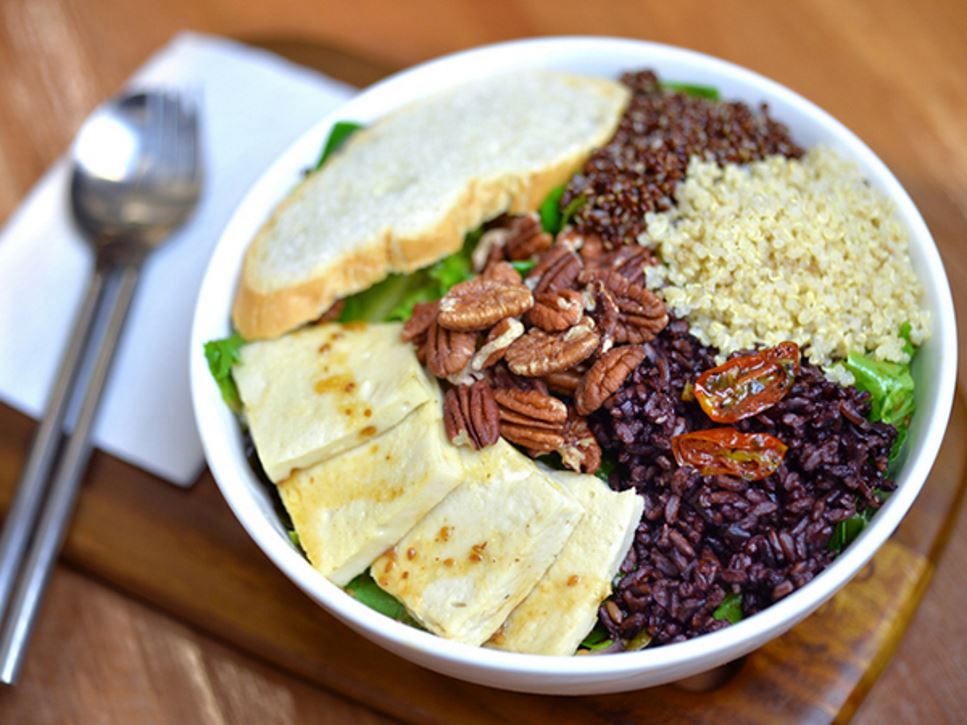Vegetarian meals are gaining popularity — even among regular meat-eaters. As more and more individuals reduce their meat intake, one essential question remains: Are vegetarian and vegan diets healthy? The answer is: They can be.
Many myths still surround the health implications of a vegetarian diet. Learn the facts below.
Myth #1: Vegetarians and vegans have a hard time getting enough protein.
As meat has become synonymous with protein, many people struggle to identify non-meat sources of this essential nutrient. Despite this, adequate protein can easily be obtained without meat through a well-planned and varied diet. Plant-based sources of protein typically contain more dietary fiber and less saturated fat than animal-based sources of protein. These two factors are cornerstones of a heart-healthy diet.
There are many versatile plant-based sources of protein that fit into a healthy eating plan: beans, lentils, peas, soy products, nuts and seeds. There’s even protein in whole grains. For lacto-ovo vegetarians, low-fat or fat-free dairy and eggs can be an important protein source. For high-protein vegan options, some familiar foods may include bean burritos, tofu and vegetable stir-fries, or lentil chili.
Myth #2: To build strong bones, you must include dairy in your diet.
Dairy is not the only food that can help build and protect strong bones. A number of nutrients are needed for bone health, including calcium, vitamin D and protein. Calcium can be found in a variety of plant foods such as kale, broccoli, bok choy, calcium-set tofu and fortified soymilk. Some vegetables such as spinach and rhubarb have a higher calcium content, but they also are high in oxalates, which decrease calcium absorption. Include a wide variety of other leafy green vegetables throughout the day to help promote calcium absorption.
If you are forgoing dairy, ensure that you get the recommended amounts of both calcium and vitamin D by choosing fortified foods and beverages such as plant-based milk alternatives, ready-to-eat cereals and 100% fruit juices. Mushrooms treated with ultraviolet light are another possible source of vitamin D. For some individuals, a calcium and vitamin D supplement may be recommended. In addition to following a nutrient-rich diet, weight-bearing activities such as yoga, running, brisk walking and strength training are an essential component of increasing bone strength.
Myth #3: Eating soy increases risk of breast cancer.
For vegans and vegetarians, incorporating fortified soy products in the diet is an easy way to meet both protein and calcium requirements. Despite news headlines to the contrary, there is no proof soy causes cancer. Actually, there is evidence that consuming soy in childhood and adolescence produces a lower lifetime risk for breast cancer, whereas beginning soy in adulthood doesn't appear to offer the same level of protection. No matter your diet preference, variety is key. Swapping animal-based protein for soy is a good way to add variety to your meals. Aim for less processed sources of soy such as tempeh, edamame and tofu.
Myth #4: Vegetarian diets are not appropriate for pregnancy, childhood or athletics.
A well-planned vegetarian or vegan diet can meet the nutrient needs of people during all stages of life, including pregnancy, lactation and childhood, as well as for those who participate in competitive sports. It's just about making sure you get the nutrients you need.
Fortified foods and beverages can help to increase the intake of certain nutrients. For nutrients that are primarily found in animal foods, like vitamin B12, or when nutrient requirements increase during certain life stages, a supplement may be needed. During pregnancy, for example, more iron is needed, but iron is not absorbed as well from plant-based sources. Pregnant individuals should eat plenty of iron-rich foods, plus a source of vitamin C to help increase absorption, and discuss the possible need for a supplement with their health care provider. Try these iron and vitamin C combinations: beans and salsa, broccoli and tofu, black-eyed peas and collard greens.
For infants, children and adolescents, a well-planned vegetarian diet can promote normal growth. Calorie and nutrient needs typically can be fulfilled if the diet provides enough calories and diversity of foods. Incorporating fortified foods and beverages and/or supplements may be needed in order to get the recommended amount of certain nutrients.
And while most competitive athletes require increased energy, protein and nutrient needs for optimal performance, there's no reason they can't get everything they need nutritionally from plant sources. All it takes is a little carefulness with menu planning.
Myth #5: If something is vegetarian, it means it is healthy.
Foods that are "vegetarian" or "vegan" don't automatically equal good health. While some cookies, chips and sweetened cereal might be vegetarian options, they also can be high in added sugars or sodium. Meatless eaters might find it easy to load up on processed foods such as veggie burgers, but less processed options should make up the bulk of a vegetarian diet.
So what is the best way to ensure a food is a good choice? Load up on veggies, fruits, whole grains and lean protein foods. Also, read the Nutrition Facts Label. Look for low levels of saturated fat, added sugars and sodium. These are much better indicators of a food's health than whether or not it is vegetarian.
Find a Nutrition Expert
Looking for credible nutrition information and recommendations? The Academy of Nutrition and Dietetics' network of credentialed food and nutrition practitioners are ready to help!

